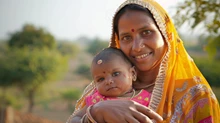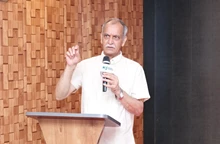
Prime Minister Narendra Modi, President Ram Nath Kovind, Home Minister Amit Shah and several prominent leaders paid tribute to India’s former Prime Minister Atal Bihari Vajpayee on his first death anniversary at the memorial in Delhi early this morning.
Namita Kaul Bhattacharya, Vajpayee's adopted daughter, and granddaughter Niharika were also present at the function.
The memorial for the iconic leader, Sadaiv Atal, was unveiled on his 94th birth anniversary last December.
Mr. Vajpayee's birthday anniversary, on December 25, is celebrated as ''Good Governance Day'' by the party and awarded with Bharat Ratna in 2014. Atal Bihari Vajpayee was a highly respected politician who served as the 10th Prime Minister of India.
Let’s take a glimpse of the past life and journey of this incredible personality of India.

Vajpayee was born in a Brahmin family to Krishna Devi and Krishna Bihari Vajpayee on 25 December 1924 in Gwalior. His grandfather, Pandit Shyam Lal Vajpayee, had migrated to Morena, Gwalior from his ancestral village of Bateshwar, Uttar Pradesh. His father was a school teacher in his hometown.
Vajpayee was first elected to parliament in 1957 as a member of the Bharatiya Jana Sangh (BJS). In 1977 the BJS joined three other parties to form the Janata Party, which led a government that lasted until July 1979. As foreign minister in the Janata government, Vajpayee earned a reputation for improving relations with Pakistan and China. In 1980, following a split in the Janata Party, Vajpayee helped the BJS to reorganize itself as the BJP. In 1992 he was one of the few Hindu leaders to speak out against the destruction of the historic mosque at Ayodhya by anti-Muslim extremists.

Vajpayee took oath as a prime minister in May 1996 but was in office only 13 days, after failing to attract support from other parties. In early 1998 he again became prime minister, in elections in which the BJP won a record number of seats, but he was forced to make a shaky alliance with regional parties. In 1999 the BJP increased its seats in parliament and took hold of the government.
Although Vajpayee was considered a pragmatist, assumed a defiant posture in the face of Western criticism of India’s testing of several nuclear weapons in 1998. He had earlier been praised for his conciliatory gestures toward India’s Muslim minority.

In 2000, while he was PM, his government began an extensive program of divestment of public funds from several key state-run industries. In 2002 Vajpayee’s government was criticized for its slowness in reacting to riots in Gujarat in which some 1,000 people (mainly Muslims) died. Nevertheless, in 2003 Vajpayee made a concerted effort to resolve India’s long-running feud with Pakistan over the Kashmir region. Under his leadership, India achieved steady economic growth, and the country became a world leader in information technology. In 2004 his coalition was defeated in the parliamentary election, and he resigned from office.
The former PM announced his retirement from politics in 2005. He was awarded the Bharat Ratna in late December 2014, India’s highest civilian honor.











